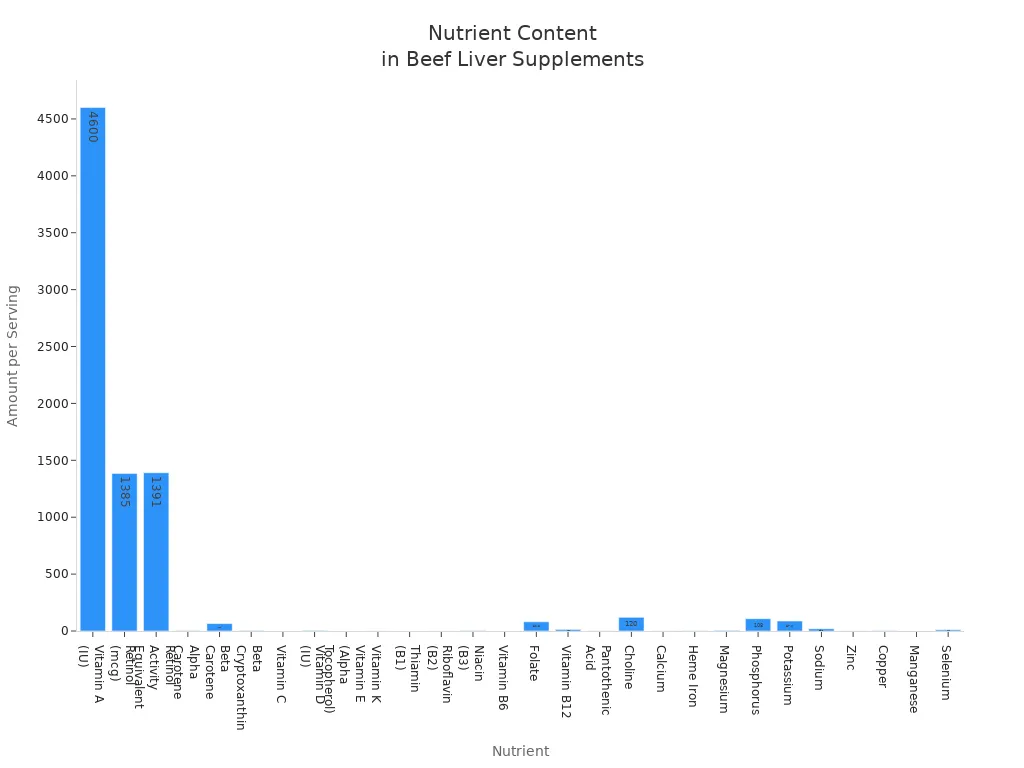
You probably want to know the safe and effective beef liver supplement dosage. Many people take beef liver supplements to support energy, boost immunity, and get the unique health benefits of beef liver. You can find beef liver in capsules, powders, or tablets, each packed with essential nutrients. These health benefits make beef liver supplements popular, but you must use caution. Always consult your healthcare provider before starting any new supplement.
Medical Disclaimer: This information is for educational purposes only. It does not replace medical advice. Please talk to a healthcare professional before making any health-related changes.
Key Takeaways
Start beef liver supplements with a low dose, such as 1-2 capsules daily, and increase slowly if well tolerated.
Take beef liver capsules with food, especially healthy fats and vitamin C-rich foods, to improve nutrient absorption.
Children need much smaller doses and should only take beef liver supplements under pediatrician guidance.
Avoid beef liver supplements if you are pregnant, breastfeeding, have liver or kidney problems, gout, or iron overload.
Watch for signs of vitamin A toxicity like headaches, skin changes, or joint pain and stop use if symptoms appear.
Choose high-quality supplements from grass-fed, pasture-raised cattle with clear labels and third-party testing.
Consult your healthcare provider before starting beef liver supplements, especially if you take medications or have health conditions.
Split your daily dose into two smaller doses to reduce stomach upset and help your body absorb nutrients better.
Beef liver supplement dosage

Recommended dosage
Adults
You may wonder about the safe beef liver supplement dosage for adults. Most clinical guidelines suggest taking 2 beef liver capsules daily with meals. This amount provides about 1 gram of freeze-dried beef liver tissue each day. Some brands recommend up to 6 beef liver capsules per day, but you should always check the label and consult your healthcare provider before increasing your dosage. Starting with a low dose, such as 1-2 beef liver capsules, helps your body adjust to supplementing with beef liver. You can gradually increase to the recommended dosage if you tolerate it well.
Children and teens
Children need much less beef liver than adults. Experts recommend no more than 1 beef liver capsule or 1 teaspoon of dried beef liver daily for children. You can introduce beef liver supplements around 6 months of age when solid foods begin. If you breastfeed, your child may benefit indirectly if you take beef liver capsules yourself. You should avoid giving children extra vitamin A supplements when they take beef liver, because too much vitamin A can cause toxicity. Always talk to your pediatrician before supplementing with beef liver for children or teens.
Special populations
Athletes and people with nutrient deficiencies often use beef liver supplements. You may see athletes and fitness enthusiasts choosing beef liver capsules to support iron and vitamin B12 levels. People who follow ancestral or paleo diets also use beef liver supplements more often. If you belong to a special population, such as athletes or those with low iron, you should still start with a low beef liver supplement dosage and increase slowly. Always monitor your body’s response and consult a healthcare professional before making changes.
Tip: If you have a medical condition or take medications, ask your doctor about the best beef liver supplement dosage for your needs.
How to take beef liver capsules
With food
You should take beef liver capsules with food for better absorption. Healthy fats like olive oil, butter, or avocado help your body absorb fat-soluble vitamins from beef liver. Eating vitamin C-rich foods, such as bell peppers or broccoli, with your beef liver capsules can boost iron absorption. You can also add beef liver capsules to smoothies or juice if you prefer.
Spacing from other supplements
You may want to space your beef liver capsules from other supplements. Splitting your daily beef liver supplement dosage into two doses, such as three capsules in the morning and three in the evening, can make it easier for your body to absorb nutrients. You do not need to follow strict timing, but spacing out your beef liver capsules may help reduce stomach upset and improve convenience.
Dosage Strategy | Description |
|---|---|
Start low | Begin with 1-2 beef liver capsules per day |
Gradually increase | Add more capsules as your body adjusts |
Split doses | Take half in the morning, half in the evening |
Take with food | Eat healthy fats and vitamin C-rich foods |
Note: Most people tolerate beef liver capsules well, but starting with a low dose helps minimize side effects and gives your body time to adjust.
What are beef liver supplements?
Beef liver supplements give you a convenient way to enjoy the health benefits of beef liver without cooking or eating organ meats. These beef organ supplements come in several forms, each designed to fit your lifestyle and preferences. You can find beef liver capsules, powders, and tablets on the market. Many people choose these supplements to boost energy, support immunity, and improve overall wellness.
Forms and types
Beef liver capsules
You will see beef liver capsules as the most popular form of beef organ supplements. Manufacturers often use grass-fed cows to create these capsules, which helps ensure a high nutrient content. Capsules come in different types, such as gelatin, vegetable, and vegan options. You may prefer beef liver capsules because they are tasteless, easy to swallow, and portable. Many brands focus on ingredient transparency, third-party testing, and minimal additives. This makes beef liver capsules a top choice for people who want a pure and simple supplement.
Tip: Beef liver capsules deliver nutrients in their natural form, which your body absorbs more efficiently than synthetic vitamins.
Powder and tablets
You might also find beef liver supplements in powder or tablet form. Powders let you mix beef liver into smoothies, shakes, or recipes. Tablets offer another easy-to-swallow option. Both forms use freeze-dried beef liver to preserve nutrients. Some people prefer powder for flexibility, while others like tablets for convenience. No matter which you choose, beef organ supplements provide a practical way to add beef liver to your diet.
Nutrient content
Beef liver supplements stand out for their high nutrient content. Each serving of beef liver capsules or powder usually contains about 3000 mg of freeze-dried beef liver, equal to one ounce of fresh beef liver. You get a powerful mix of vitamins, minerals, and protein in every dose. The nutrients in beef liver supplements include:
Vitamin B12 (over 2400% of daily value)
Copper (over 1000% of daily value)
Vitamin A (over 500% of daily value)
Selenium, vitamin B6, choline, and protein
These nutrients help your body with energy, red blood cell production, immune support, and brain health. Many people report health benefits such as increased energy, better skin, and faster muscle recovery when using beef organ supplements.
Here is a table showing the typical nutrient profile per serving of beef liver capsules:
Nutrient | Amount per Serving (approx. 3000 mg freeze-dried beef liver) |
|---|---|
Vitamin A (IU) | 4600 IU |
Vitamin B12 | 13.6 mcg |
Copper | 2.7 mg |
Heme Iron | 2.2 mg |
Choline | 120 mg |
Selenium | 11.1 mcg |
Protein | ~6 g |
You can see how beef liver supplements deliver a wide range of nutrients in a small serving. The natural form of these nutrients means your body can use them quickly and efficiently.

Note: Always check the label for sourcing and ingredient quality. Choose beef liver supplements made from grass-fed, pasture-raised cattle for the best results.
Safety of beef liver supplements

When you use beef liver supplements, you need to understand the possible risks and how to protect your health. Many people focus on the benefits, but knowing the safety information helps you make informed choices. The main concerns include vitamin A toxicity, iron overload, and allergic reactions. You should always follow recommended dosages and talk to your healthcare provider before starting any new supplement.
Vitamin A toxicity
Beef liver supplements contain high amounts of preformed vitamin A. Your body stores this type of vitamin A, so taking too much can lead to toxicity. This risk increases if you use beef liver supplements daily or combine them with other vitamin A sources.
Symptoms
Vitamin A toxicity can cause a range of symptoms. You may notice problems soon after taking a large dose (acute toxicity), or after using beef liver supplements for a long time (chronic toxicity). The symptoms can affect your skin, bones, liver, and nervous system.
Symptom Category | Common Symptoms |
|---|---|
Headache, vomiting, dizziness, irritability, nausea, abdominal pain, fever, skin rashes, visual disturbances | |
Chronic Vitamin A Toxicity | Dry, patchy skin; cracked lips; hair loss; brittle nails; bone and joint pain; stiffness; swelling of soft tissues |
In Children | Loss of appetite, joint pain, excessive bone growth |
Additional Notes | Teratogenic effects in pregnancy; decreased vision; arrhythmia; hepatic and renal failure in elderly |
You might experience headaches, rash, drowsiness, or stomach pain if you take too much at once. Over time, you could develop dry skin, hair loss, joint pain, or even bone fractures. Children may show loss of appetite or joint pain. These effects usually improve after you stop taking beef liver supplements.
Note: Vitamin A toxicity often goes unnoticed. If you feel unwell or notice any of these symptoms, stop using beef liver supplements and contact your healthcare provider.
Prevention
You can prevent vitamin A toxicity by following a few simple steps:
Take beef liver supplements only as directed on the label.
Avoid using other vitamin A supplements at the same time.
Do not exceed the recommended daily intake for vitamin A (usually 900 mcg RAE for men, 700 mcg RAE for women).
Monitor your health for any unusual symptoms.
Talk to your doctor before starting beef liver supplements, especially if you are pregnant, elderly, or have liver problems.
Clinical reports show that stopping beef liver supplements and other vitamin A sources helps your body recover. Vitamin A leaves your body slowly, so symptoms may take weeks or months to improve.
⚠️ Tip: High vitamin A intake from beef liver supplements can double your risk of bone fractures and cause liver damage. Always use the lowest effective dose.
Iron overload
Beef liver supplements provide a rich source of heme iron. While iron supports healthy blood and energy, too much iron can harm your body. Iron overload happens when your body stores more iron than it needs. This condition can damage your liver, heart, and pancreas.
You may face a higher risk of iron overload if you have certain genetic conditions, such as hemochromatosis, or if you take multiple iron-containing supplements. Symptoms of iron overload include fatigue, joint pain, abdominal pain, and abnormal liver tests. Over time, iron overload can lead to organ damage and serious health problems.
To lower your risk:
Use beef liver supplements only as recommended.
Avoid combining them with other iron supplements unless your doctor advises it.
Get your iron levels checked regularly if you use beef liver supplements long-term.
Tell your healthcare provider about all supplements you take.
Note: Iron overload is rare in healthy people, but it can develop if you use beef liver supplements in high doses or for long periods.
Allergic reactions
Most people tolerate beef liver supplements well, but allergic reactions can occur. The main allergen in beef liver is a carbohydrate called alpha-gal. If you have alpha-gal syndrome, you may react to beef liver supplements with symptoms like hives, stomach pain, or even anaphylaxis. This allergy often develops after certain tick bites and can cause delayed reactions several hours after eating red meat or taking beef liver supplements.
Other allergic reactions to beef liver supplements are rare. If you have a known red meat allergy or have experienced unexplained allergic symptoms after eating beef, you should avoid beef liver supplements. Always read labels and consult your doctor if you have concerns about allergies.
Medical Disclaimer: This safety information is for educational purposes only. It does not replace medical advice. Always consult your healthcare provider before making changes to your supplement routine.
Other side effects
You may experience other side effects when you take beef liver supplements. Most people tolerate these supplements well, but some reactions can occur. You should know what to watch for and how to respond if you notice any changes.
Some people report mild digestive issues. You might feel bloating, nausea, or stomach cramps after taking beef liver capsules. These symptoms often improve when you take the supplement with food or reduce your dosage. If you have a sensitive stomach, start with a low dose and increase slowly.
You could notice changes in your skin. Some users report acne or oily skin after starting beef liver supplements. This effect may relate to the high vitamin A content. If you see new skin problems, stop using the supplement and talk to your healthcare provider.
You may feel headaches or dizziness. These symptoms can happen if your body reacts to the nutrients in beef liver. Sometimes, these signs point to early stages of toxicity. You should monitor your health and avoid increasing your dosage without medical advice.
Rarely, you might experience joint pain or muscle aches. These symptoms can result from nutrient imbalances or excess vitamin A. If you feel pain that does not go away, stop the supplement and seek medical help.
Here is a table summarizing possible side effects and what you can do:
Side Effect | What You Can Do |
|---|---|
Digestive upset | Take with food, lower your dose |
Skin changes | Stop supplement, consult your doctor |
Headache/dizziness | Monitor, avoid increasing dosage |
Joint/muscle pain | Discontinue, seek medical advice |
Tip: You should always follow the recommended dosage. Exceeding the suggested amount increases your risk of side effects and toxicity.
If you notice any unusual symptoms, stop taking beef liver supplements and contact your healthcare provider. You should never ignore persistent or severe reactions.
Medical Disclaimer: This information is for educational purposes only. It does not replace medical advice. You should consult a healthcare professional before making any health-related decisions or changes.
Who should avoid beef liver supplements
At-risk groups
You need to know that not everyone should take beef liver supplements. Some groups face higher risks of side effects or health problems. Medical guidelines highlight several populations who should avoid or use extra caution with beef liver.
People taking medications that may interact with certain vitamins and minerals
People with iron overload disorders
Children
Pregnant individuals
People with autoimmune diseases
Pregnant or breastfeeding
If you are pregnant or breastfeeding, you should be very careful with beef liver. High vitamin A levels in beef liver can harm your baby’s health and development. Too much vitamin A during pregnancy may cause birth defects. Breastfeeding mothers also risk passing excess vitamin A to infants. Healthcare providers often recommend getting nutrients from a balanced diet instead of supplements during this time. Always talk to your doctor before using beef liver supplements if you are pregnant or breastfeeding.
Children under 18
Children and infants have different needs than adults. Their bodies are more sensitive to high doses of vitamins and minerals. Introducing beef liver to babies can support proper growth and development, but you must follow safe guidelines. If you wonder how much liver is okay to give babies, most experts suggest very small amounts, such as a tiny piece or a small spoonful, no more than once or twice a week. For infants, too much beef liver can cause vitamin A toxicity or iron overload. If you want to know how to get babies and kids to eat beef liver capsules, always consult your pediatrician first. Supplements are rarely needed for healthy children who eat a balanced diet.
Liver disease or gout
If you have liver disease or gout, you should avoid beef liver supplements. The high vitamin A and iron content can put extra stress on your liver. People with these conditions may develop serious complications from even small amounts of beef liver. Healthcare providers often advise against supplements for these groups due to the risk of liver damage. You should always discuss any supplement use with your doctor if you have a history of liver problems.
High iron levels
People with high iron levels or iron overload disorders, such as hemochromatosis, should not use beef liver supplements. The heme iron in beef liver can quickly raise your body’s iron stores to dangerous levels. This can damage your organs and affect your health and development. If you have high iron, your doctor may recommend avoiding all iron-rich supplements, including beef liver.
Drug and supplement interactions
Beef liver supplements can interact with many common medications. These interactions often involve the liver, where both drugs and nutrients are processed. A large study found that over one-third of supplement users took combinations that could affect the liver, especially those with pre-existing liver conditions. You should always tell your healthcare provider about all supplements and medications you use.
Medication Category | Interaction Mechanism | Impact on Medication or Health | Recommended Precautions |
|---|---|---|---|
Blood Thinners (e.g., Warfarin) | High vitamin K content affects blood clotting | Alters INR levels, affecting blood clotting control | Maintain consistent vitamin K intake; monitor INR closely |
Retinoid Medications (Vitamin A derivatives) | High vitamin A content from liver supplements | Risk of vitamin A toxicity (headaches, liver strain) | Avoid combining with other vitamin A sources |
Statins and Blood Pressure Medications (ACE inhibitors) | Liver metabolism burden increased by liver nutrients | Potential liver enzyme elevation and liver stress | Regular liver function tests advised |
Thyroid Hormones (Levothyroxine) | Iron and calcium interfere with absorption | Reduced absorption of thyroid medication | Separate dosing by at least 4 hours |
Iron Supplements | High heme iron content in beef liver | Risk of iron overload or stomach discomfort | Use only one iron source based on bloodwork |
Hormonal Medications (Birth control, hormone therapy) | Liver enzyme modulation affecting metabolism | Possible altered metabolism of hormones | Monitor symptoms and hormone levels |
Painkillers (Ibuprofen, Acetaminophen) | Combined liver stress | Increased risk of liver strain | Limit use and consult healthcare provider |
You should use caution if you take blood thinners, retinoids, statins, ACE inhibitors, thyroid hormones, iron supplements, hormonal therapies, or painkillers. These drugs may interact with beef liver, leading to side effects or reduced effectiveness. Always monitor your health and consult your healthcare provider before starting beef liver supplements.
Medical Disclaimer: This information is for educational purposes only. It does not replace medical advice. Always consult a healthcare professional before making any health-related decisions or changes.
Choosing high-quality beef liver supplements
Sourcing and processing
You want to choose beef organ supplements that come from trusted sources. The liver acts as a filter in animals, so the quality of the source matters. Look for products made from grass-fed, grass-finished, and pasture-raised cattle. These animals eat natural diets and live in cleaner environments. This reduces the risk of toxins, pesticides, and heavy metals in your supplements. Many high-quality beef organ supplements use organic beef liver. Sourcing from unpolluted regions also helps ensure safety and better nutrient content.
Processing methods affect the nutrients in beef organ supplements. Freeze-drying preserves vitamins and minerals better than high-heat drying. You should check if the product uses gentle drying methods to keep nutrients intact. Desiccated beef liver means the liver is dried and ground into powder, which keeps most of the micronutrients found in fresh liver. Always choose brands that explain their sourcing and processing steps clearly.
Third-party testing
Third-party testing gives you confidence in the safety and quality of beef organ supplements. Independent labs test for contaminants like heavy metals, pesticides, and harmful bacteria. Reliable certifications include USDA Organic, GMP (Good Manufacturing Practices), and NSF. These show that the product meets strict standards for purity and potency.
You should look for supplements made in GMP-certified facilities. This means the company follows high safety and quality rules during production. Some brands also display NSF or Informed Choice logos, which show the product passed extra audits. Certificates of Analysis (CoA) are important. They confirm the identity, purity, and strength of the supplement. CoAs also show that the product is free from dangerous levels of lead, cadmium, E. coli, and Salmonella.
Tip: Always check if the company provides third-party test results or CoAs. This helps you avoid low-quality or unsafe beef organ supplements.
Reading labels
Reading labels helps you pick the best beef organ supplements for your health. Start by checking the source. The label should say if the product uses organic, grass-fed, and grass-finished beef liver. Look for certifications like 100% Organic, Verified Grass-fed, and Non-GMO Project Certified. These labels mean the supplement is free from GMOs, artificial feeds, and harmful chemicals.
You should also check the ingredient list. High-quality beef organ supplements contain only beef liver and a capsule, with no fillers or additives. The label should list the amount of beef liver per serving and the serving size. Some products may also show the region or farm where the cattle were raised. This adds another layer of trust.
Label Feature | What to Look For |
|---|---|
Source | Grass-fed, grass-finished, organic |
Certifications | USDA Organic, GMP, NSF, Non-GMO |
Ingredients | Pure beef liver, no fillers |
Testing | Third-party tested, CoA available |
Sourcing Transparency | Farm or region listed |
Medical Disclaimer: This information is for educational purposes only. It does not replace medical advice. Always consult a healthcare professional before making any health-related decisions or changes.
Best practices for safe use
Start low and monitor
You want to get the most benefits from beef liver supplements while keeping your health safe. The best way to start is by using a low dose. This approach helps your body adjust and lowers the risk of side effects. Many people find that starting slow makes it easier to notice how their body responds.
Begin with a small amount of beef liver, such as one or two capsules per day.
Take your supplement with food. This step can reduce nausea or stomach discomfort.
Watch for any signs of digestive upset or changes in how you feel.
Avoid taking other sources of vitamin A or iron at the same time. This practice helps prevent toxicity.
Always check the label for recommended dosages and do not exceed them.
Choose high-quality beef liver supplements made from grass-fed cattle and tested by third parties.
If you have a medical condition or take medications, consult your healthcare provider before starting.
Monitor for symptoms like headaches, skin changes, or joint pain. These may signal that you need to adjust your dose.
Consider regular blood tests to check your liver enzymes and iron levels, especially if you use beef liver long-term.
Use extra caution if you have liver disease, gout, iron overload, or if you are pregnant or breastfeeding.
You should always use caution when taking beef liver capsules. Starting low and monitoring your body helps you avoid unwanted effects and supports your health goals.
When to seek medical advice
Sometimes, you may notice symptoms that mean you need to talk to a healthcare professional. Knowing when to seek help keeps you safe and helps you get the most from your supplement routine.
Description | Recommendation | |
|---|---|---|
Digestive Discomfort | Upset stomach or digestive issues, especially when taken on an empty stomach. | Take supplements with food to reduce discomfort; monitor symptoms. |
Allergic Reactions (Rare) | Symptoms like itching, swelling, or hives in people allergic to beef. | Seek medical advice immediately if allergic symptoms appear. |
Iron Overload Risk | Excess iron intake can cause issues in individuals with iron metabolism disorders. | Monitor iron intake carefully; consult a doctor if symptoms of iron overload occur. |
Mild Detoxification Effects | Headaches or stuffy nose due to detoxification process when starting supplements. | Ease into supplement dosage gradually; reduce dose if symptoms persist. |
If you experience any of these symptoms, do not ignore them. You should stop using beef liver and contact your healthcare provider. Using caution helps you avoid serious health problems and ensures you use supplements safely.
Medical Disclaimer: This information is for educational purposes only. It does not replace medical advice. Always consult a healthcare professional before making any health-related decisions or changes.
You can enjoy the benefits of beef liver by following safe supplement practices.
Moderate beef liver intake helps you avoid vitamin A toxicity and iron overload.
You should avoid beef liver if you have allergies, gout, high cholesterol, or are pregnant or breastfeeding.
Always choose beef liver supplements from grass-fed sources with transparent labeling.
Consult your healthcare provider before starting beef liver, especially if you take medications or have health conditions.
Making informed choices about beef liver supports your health and safety.
Medical Disclaimer: This information is for educational purposes only. It does not replace medical advice. Always consult a healthcare professional before making health-related decisions.
FAQ
How long does it take to see results from beef liver supplements?
You may notice benefits like increased energy or better skin within a few weeks. Results depend on your diet, health, and consistency. Some people feel changes sooner, while others need more time.
Can you take beef liver supplements every day?
Yes, you can take beef liver supplements daily if you follow the recommended dosage. Always check the label and talk to your healthcare provider before starting a daily routine.
Do beef liver supplements taste like liver?
Most beef liver capsules and tablets have no taste or smell. Powders may have a mild liver flavor. You can mix powder into smoothies or juice to mask the taste.
Are beef liver supplements safe for vegetarians or vegans?
No, beef liver supplements come from animal sources. Vegetarians and vegans should avoid them. You can look for plant-based alternatives for similar nutrients.
Can you take beef liver supplements with other vitamins?
You can take beef liver supplements with other vitamins, but avoid extra vitamin A or iron. Too much of these nutrients can cause health problems. Always check with your doctor before combining supplements.
Do beef liver supplements help with anemia?
Beef liver supplements provide heme iron and vitamin B12, which support healthy blood. They may help if you have low iron or B12. You should confirm your needs with a healthcare provider.
What is the best time of day to take beef liver supplements?
You can take beef liver supplements with meals for better absorption. Many people split the dose between morning and evening. Taking them with food helps reduce stomach upset.
Can children take beef liver supplements?
Children can take beef liver supplements in small amounts. Always use a lower dose and talk to a pediatrician first. Too much vitamin A or iron can harm children.
Medical Disclaimer: This information is for educational purposes only. It does not replace medical advice. Always consult a healthcare professional before making health-related decisions.


